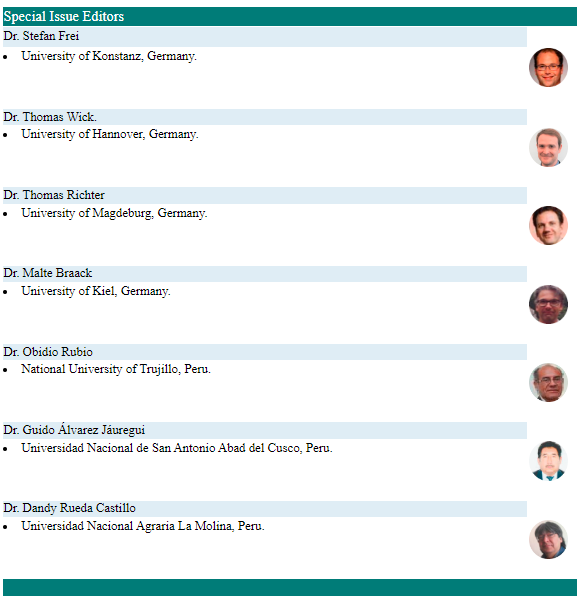Un conjunto atractor positivamente invariante para un modelo depredador-presa con respuesta funcional no-diferenciable
DOI:
https://doi.org/10.17268/sel.mat.2022.02.02Palabras clave:
modelo depredador-presa, conjunto invariante, respuesta funcional.Resumen
En el presente trabajo demostramos que un modelo depredador-presa está bien puesto en el sentido ecológico a través de evidenciar que existe un conjunto atractor positivamente invariante para las soluciones del modelo. El modelo depredador-presa en estudio considera crecimiento logístico en ambas poblaciones y una respuesta funcional no-diferenciable. Esta respuesta funcional es una generalización de otras consideradas en otros trabajos. Por causa de la no-diferenciabilidad, no podemos garantizar unicidad de soluciones y los métodos clásicos no pueden ser aplicados directamente. Usando equivalencias topológicas, argumentos geométricos y el teorema de Poincaré-Bendixon obtenemos nuestro resultado.
Citas
Rosenzweig ML. Paradox of enrichment: destabilization of exploitation ecosystems in ecological time. Science. 1971;171(3969):385–387.
Cobb CW, Douglas PH. A theory of production. Papers and Proccedings of the Fortieth Annual Meeting of the American Economic Association. 1928;18(1):139–165.
Clark CW. Mathematical Bioeconomics: The Optimal Management of Renewable Resources (2nd edition). Wiley, New York; 1990.
Freedman H. Stability analysis of a predator–prey system with mutual interference and density–dependent death rates. Bulletin of Mathematical Biology. 1979;41(1):67–78.
González-Olivares E, Sáez E, Stange E, Szanto I. Topological Description of a Non-Differentiable Bioeconomics Model. Rocky Mountain Journal of Mathematics. 2005 08;35:1133–1155.
Leslie P, Gower J. The properties of a stochastic model for the predator-prey type of interaction between two species. Biometrika. 1960;47(3/4):219–234.
Aziz-Alaoui M, Okiye MD. Boundedness and global stability for a predator-prey model with modified Leslie–Gower and Holling–type II schemes. Applied Mathematics Letters. 2003;16(7):1069–1075.
Díaz-Avalos JD, González-Olivares E. A class of predator-prey models with a non-differentiable functional response. In:Vigo- Aguiar J, editor. Proceedings of the 17th International Conference on Computational and Mathematical Methods in Science and Engineering, CMMSE 2017. vol. 3; 2017. p. 765–776.
Rivera-Estay V, González-Olivares E, Rojas-Palma A, Vilches-Ponce K. Dynamics of a class of Leslie-Gower predation models with a non-differentiable functional response. In: Dutta H, Peters J, editors. Applied Mathematical Analysis: Theory, Methods, and Applications, Studies in Systems, Decision and Control. vol. 117; 2020. p. 433–457.
Descargas
Publicado
Cómo citar
Número
Sección
Licencia
Derechos de autor 2022 Selecciones Matemáticas

Esta obra está bajo una licencia internacional Creative Commons Atribución 4.0.
Los autores/as que publiquen en esta revista aceptan las siguientes condiciones:
- Los autores/as conservan los derechos de autor y ceden a la revista el derecho de la primera publicación, con el trabajo registrado con la licencia de atribución de Creative CommonsAtribución 4.0 Internacional (CC BY 4.0) , que permite a terceros utilizar lo publicado siempre que mencionen la autoría del trabajo y a la primera publicación en esta revista.
- Los autores/as pueden realizar otros acuerdos contractuales independientes y adicionales para la distribución no exclusiva de la versión del artículo publicado en esta revista (p. ej., incluirlo en un repositorio institucional o publicarlo en un libro) siempre que indiquen claramente que el trabajo se publicó por primera vez en esta revista.
- Se permite y recomienda a los autores/as a publicar su trabajo en Internet (por ejemplo en páginas institucionales o personales) antes y durante el proceso de revisión y publicación, ya que puede conducir a intercambios productivos y a una mayor y más rápida difusión del trabajo publicado(Consultar: efecto del acceso abierto).













